Many of us tuning into the news might be thinking our World is heading for certain doom. There's often horrible news, and that's what the mainstream media thrives on. Feeding on fear, uncertainty and doubt. We have all felt it. We know the media's biases, yet can't help but feel down.
It is important to put things into perspective. This is what this article intends to do, compiling data from various sources that point to an unanimous truth - Our World is getting better all the time.
The format of this article would be a chart followed by analysis - some of which I have compiled myself in my style, while some I have republished. The source and data for each will be mentioned clearly. We will look at - Violence (Homicide and War), Health, Education, Human Rights and Environment.
But first, this post is inspired by the amazing book "Better Angels of our Nature" by Steven Pinker. Due to the nature of the blogging format, I'll only touch upon a limited set of data very briefly. For a comprehensive analysis of the situation, I heartily recommend checking out this book. For this post, accusations of cherry picking would be fair due to the limited data set, but not so with Pinker's book.
Five hundred years ago - There Was Blood
500 years is an absolute blink of an eye in evolutionary terms. If life has existed for an entire year, the last 500 years are just a couple of seconds in that year!
So let's look back at life 500 years ago, in general. Most nations were ruled by power hungry kings and authoritarian entities. There was constant war, while the citizens struggled to survive. Famine, disease and crime was widespread. People murdered each other on petty disagreements, and the law never managed to cope with rampant crime. Ego, self-preservation and greed run amok while compassion took a back seat. You couldn't blame them either - it was a harsh life.
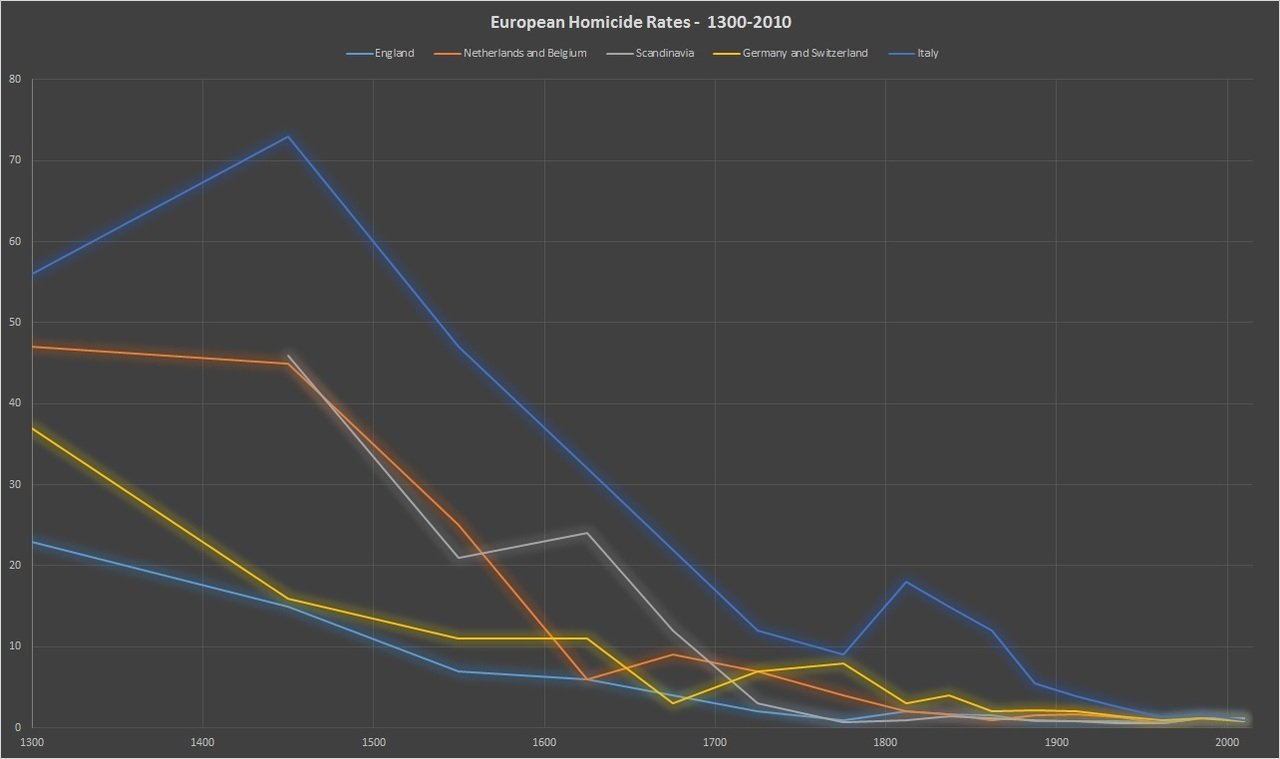
Source: Eisner (2003) – Long-Term Historical Trends in Violent Crime. In Crime and Justice, UNODC, Max Roser
Perhaps the most widespread impact of violence are homicides. While wars may not affect most citizens, homicides affect everyone.
Right away, it's clear as day - homicide rates have absolutely plummeted! Continually throughout the decades. The chance of getting killed in 1450 was akin to that of getting into a fight today. Things are 40-50 times safer today.
It's worth nothing that there was a temporary uptick in US Homicide Rates between 1970 and 1990 - but no other major county. But it has been declining steadily since then.
War
There is no human activity as devastating as War. This awesome chart collapses all the major war activity worldwide for the last few centuries. Note that this is chart is after the Mongol Conquests, which is among the deadliest manmade events of all time - wiping off 12% of the world's population! Compare that to just 2.2% for World War II. It would be way off this chart.
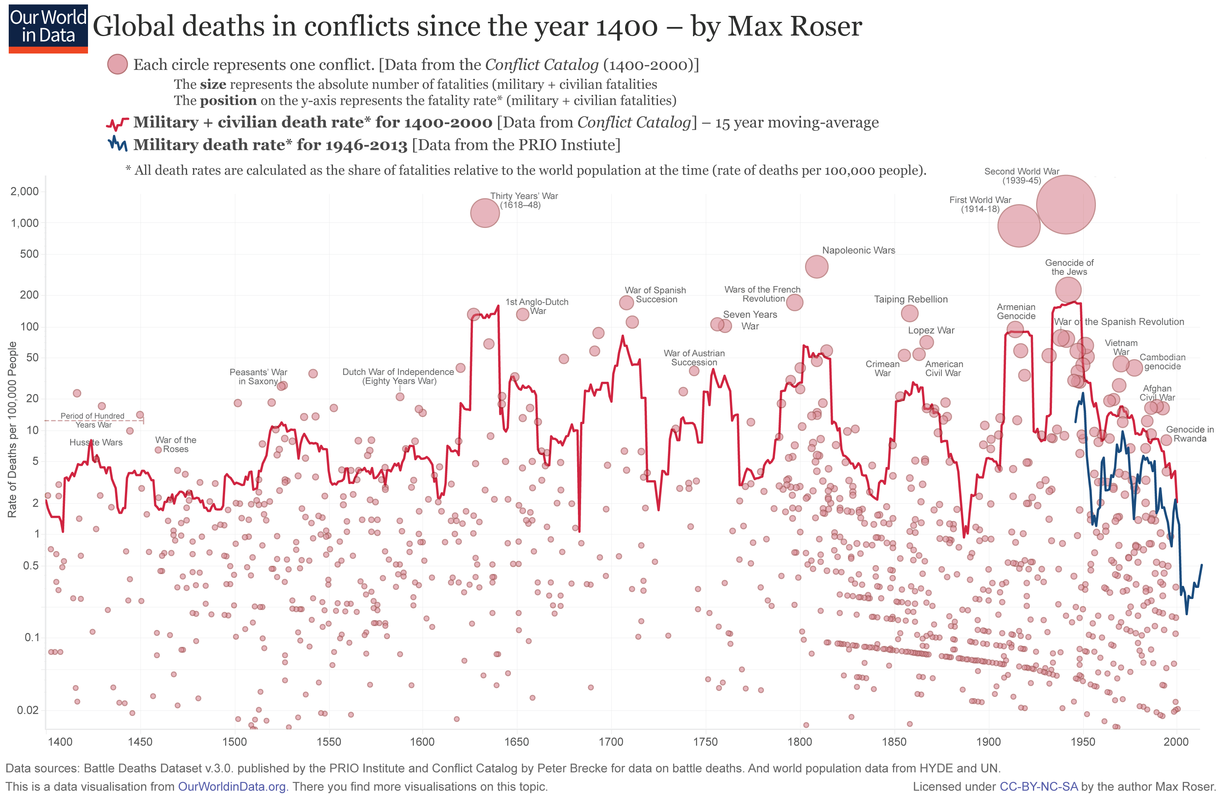
Source: OurWorldinData.org (visit for further sources)
There are many way to look at this chart. Humanity was very late to realize the futility of war, relative to some other metrics here. Minor / local wars have been in the decline for a long time, but till World War II they were compensated for by major global wars. Overall, despite ups and downs, the destructive impact of wars remained constant for 500 years. It took World War II for us to come back to our senses.
War since World War II
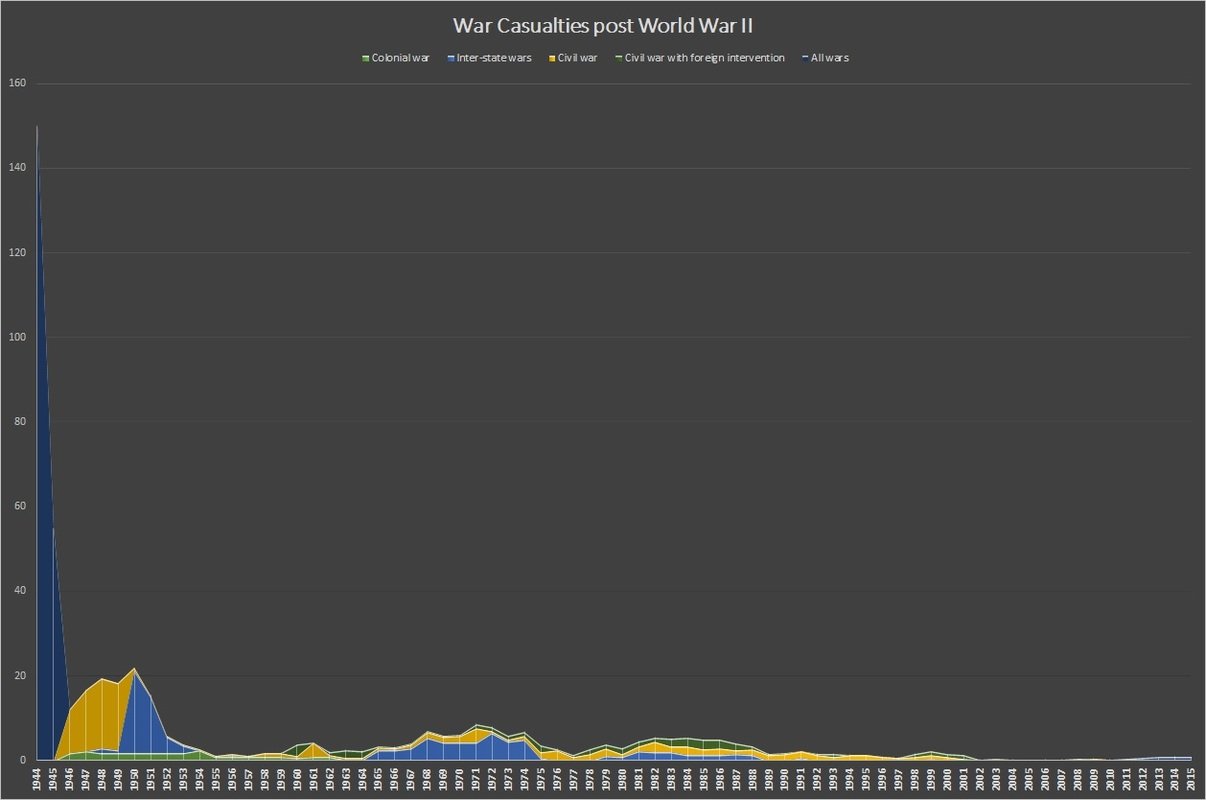
Source: PRIO Data, Wikipedia Ongoing Conflicts (See for further sources)
There was an spectacular decline right after World War II. This was the turning point. Once things settled down following WW2 aftermath, there was relative peace, with some hairy moments over the Cold War. This century, despite the Iraq War, is the most peaceful humanity has ever been.
The sharp eyed of you will notice a slight increase this decade. However, that has hit its peak in 2014. It's true that the Levant conflict has grown in 2015 and 16, but on the other hand, the East African conflicts have settled down.
Health
While wars may have been deadly, disease and epidemics were far worse. Black Death killed off over 30% of Europe's entire population in half a decade! Healthcare has been improving steadily, as has life expectancy. It's hard to believe, but just a 100 years back, most people were expected to die in their late 40s to early 50s. Today, most people think about living till into their 70s or 80s. There have been incredible advances in healthcare, and continues to this day, with no signs of slowing down.
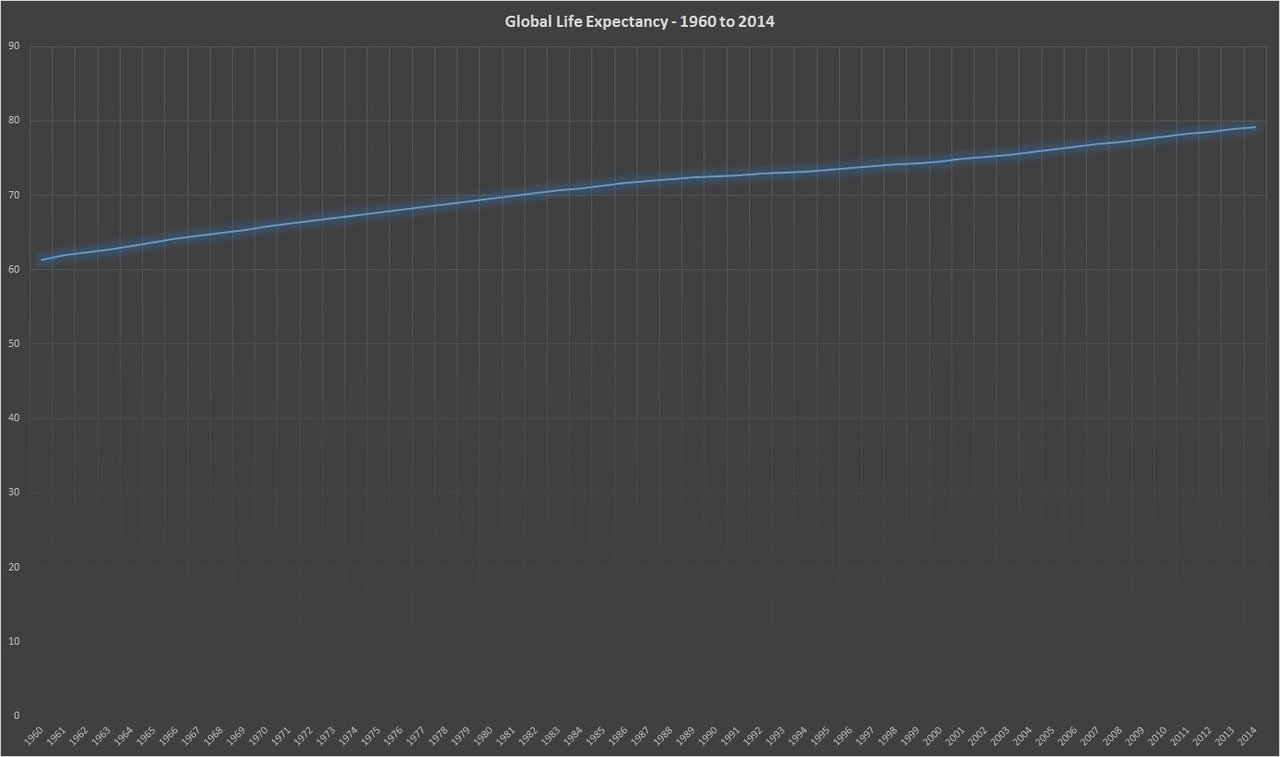
Source: The World Bank
Education
Western Europe was early to the idea of education for all. It is the root of any major growth for our civilisation whether it be cultural (The Renassaince) or technological (Industrial Revolution). Some other regions such as South Asia and Africa have only very recently recognized the power of education. These regions are growing their education programs sharply. It's only a matter of time before these regions attain 100% basic education which the more developed regions did in the late 20th century. There will be great progress in human ingenuity once that happens.
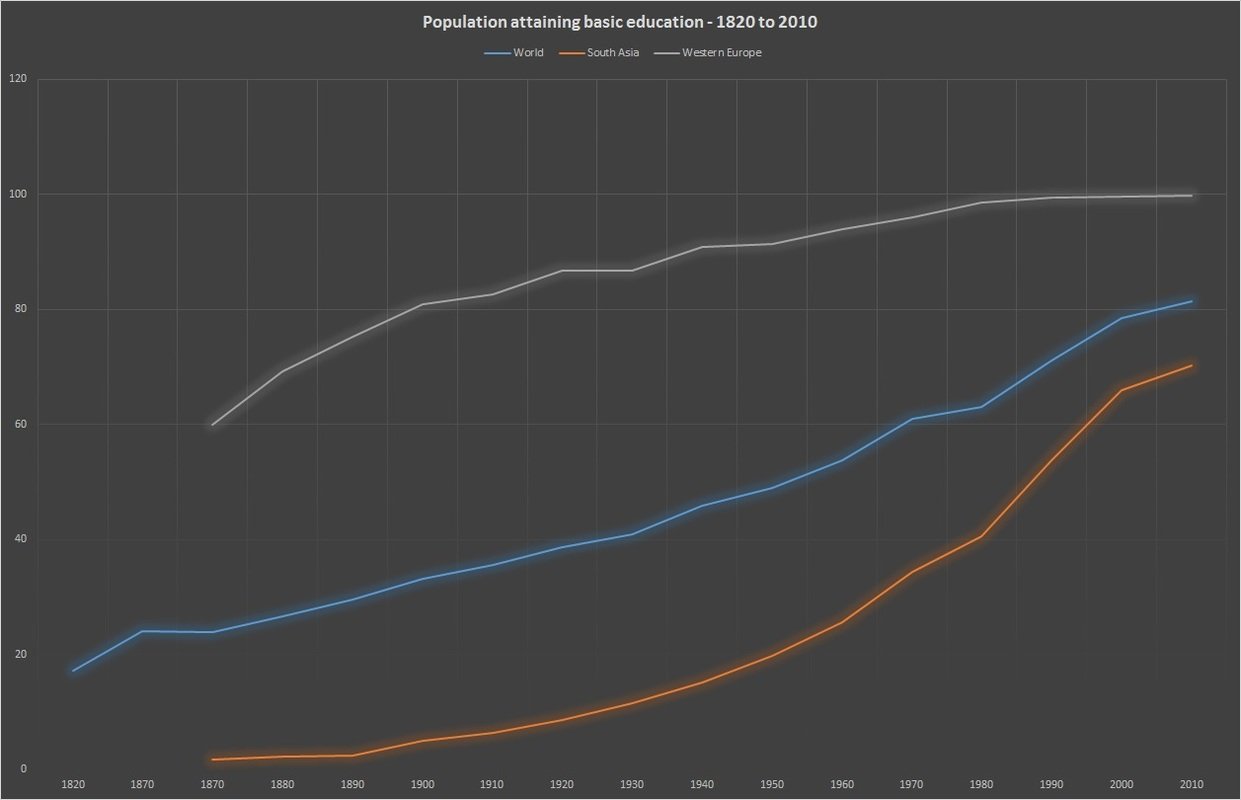
Source: Clio Infra, OurWorldinData
Human Rights
Human rights has been the central tenet of any progressive society. The ride has been rocky - the Cold War particularly led to xenophobia and excessive conservatism. Since then, though, it has been a significant uptick in human rights protection across all spheres. This is one of the most obvious changes we have noticed in our lifetime.
For a detailed analysis, check out the awesome paper linked in the Source.
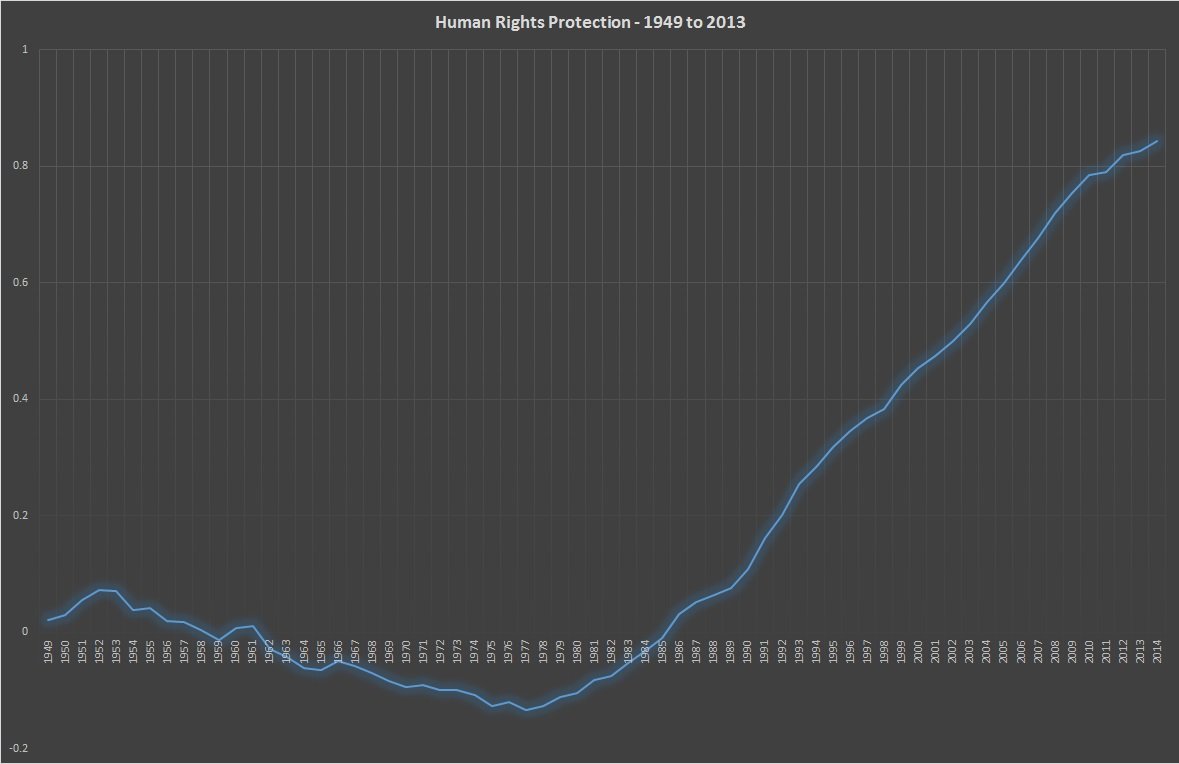
Source: Dynamic Patterns of Human Rights Practices by Schnackenberger and Farris
Environment
It's pretty clear that the world has got better and humanity has progressed immensely. But at what cost? This is one are where have messed up real bad. From pollution to deforestation to climate change, we have stripped the planet's life resources to our own advantage. Climate change is of course the number one issue, but I wanted to share a different data set which is even more alarming.
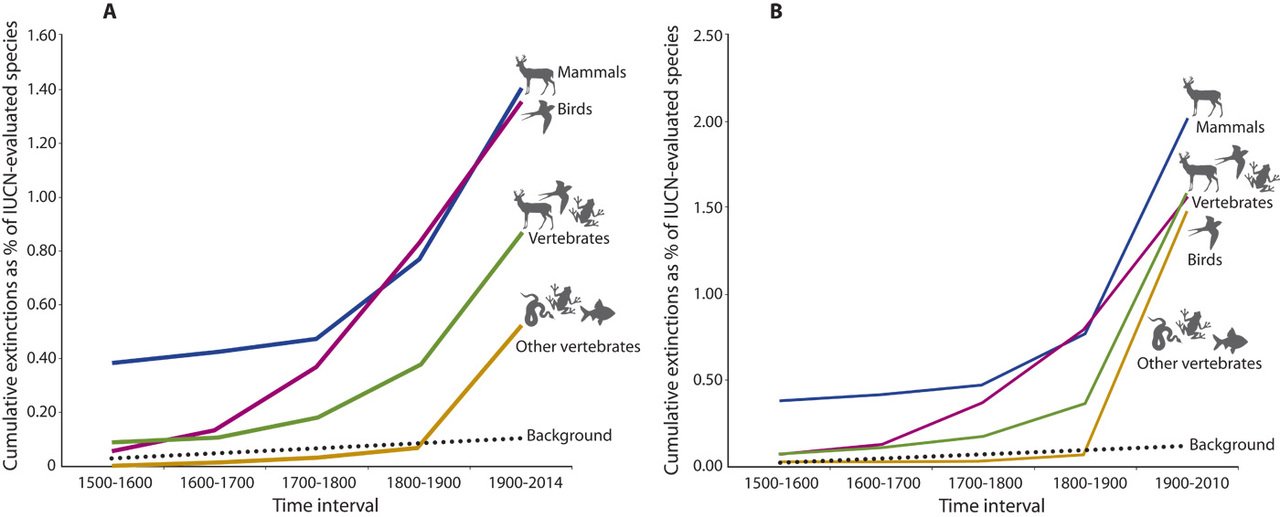
Source: Accelerated modern human–induced species losses: Entering the sixth mass extinction.
A is highly conservative, B is conservative, so the situation is much worse.
We have entered a mass extinction - the biggest one since the K/T extinction event that killed off the non-avian dinosaurs. Over the coming decades, this event - Holocene extinction - will become a major point of discussion.
The environment may be in the doldrums, but 0there's optimism that we have reached the bottom and are fighting back. Here's a great talk by Al Gore on the matter, with further statistics that show how we are back on the positive track. This could be our World War II moment, where things improve significantly for the better.
The Future
The Millennium Project has an intriguing index which covers all these factors into a single "State of the Future" (SOFI) index. The prognosis is bright despite some challenges.

Do check out more about the SOFI.
We have challenges, but we are doing just fine
There's no question that our World has major challenges, most significant of those being the environment and in the short term, terrorism. But look back through a millennia of history. Time and time again, humanity has proven that we can fix our problems, often dramatically.
So next time you feel down, remember that things have been getting better for centuries, and will continue to do so long after we are gone.
